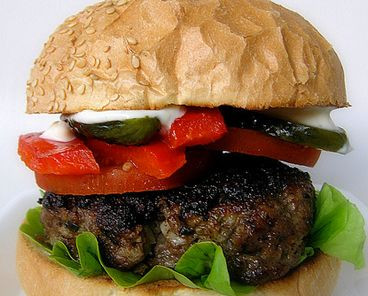'Fatting in': Immigrant groups eat high-calorie American meals to fit in

Immigrants to the United States and their U.S.-born children gain more than a new life and new citizenship. They gain weight. The wide availability of cheap, convenient, fatty American foods and large meal portions have been blamed for immigrants packing on pounds, approaching U.S. levels of obesity within 15 years of their move.
Psychologists show that it's not simply the abundance of high-calorie American junk food that causes weight gain. Instead, members of U.S. immigrant groups choose typical American dishes as a way to show that they belong and to prove their American-ness.
"People who feel like they need to prove they belong in a culture will change their habits in an attempt to fit in," said Sapna Cheryan, corresponding author and an assistant professor of psychology at the University of Washington. "If immigrants and their children choose unhealthy American foods over healthier traditional foods across their lives, this process of fitting in could lead to poorer health," she said.
The results are published in the June issue of Psychological Science.
Public health studies show that diets of immigrants, including those from Asia, Africa and Central and South America, worsen the longer they stay in the United States.
Remembering her own self-consciousness about the healthy school lunches her mother packed for her during her childhood in Berkeley, Calif., co-author Maya Guendelman suspected that immigrants might use food as a way to appear more American. "I remember wanting lunches that would make me feel more mainstream," said Guendelman, whose parents immigrated from Chile.
Guendelman is a psychology graduate student at the University of California at Berkeley. Benoît Monin, an associate professor of psychology at Stanford University, is also a co-author.
The researchers surveyed Asian-American and white college students to learn about embarrassing childhood food memories. Sixty-eight percent of the Asian-American respondents recalled food-related insecurities around white peers while growing up, like awkwardness about using chopsticks and the custom of eating all parts of the animal – chicken feet, fish eyes and pork head. Only 27 percent of white respondents remembered embarrassing food practices from childhood.
Then, the researchers measured whether the threat of not being identified as American had an influence on food preferences. To trigger this threat, a white experimenter asked half of the participants, "Do you speak English?" before beginning the experiment. Then the 53 participants – all English-speakers and a mix of whites and Asian-Americans – wrote down their favorite foods.
Inquiring about English skills prompted 75 percent of Asian-Americans to mention a typical American food as their favorite compared with 25 percent of Asian-Americans who had not been asked if they spoke English. White participants' lists of favorite foods did not differ whether the experimenter asked if they spoke English or not.
Actual eating habits were affected, too. In a follow-up study, 55 Asian-Americans were asked to select a dish to eat from local Asian and American restaurants. Before making this selection, researchers told some participants: "Actually, you have to be an American to be in this study," as a way of threatening the participants' American identity.
The participants whose American identity was threatened chose more American dishes, such as hamburgers and grilled cheese sandwiches, than Asian-American participants who were not asked if they were American. Because the sampled American dishes tended to be fattier, threatened participants ended up consuming an extra 182 calories, 12 grams of fat and seven grams of saturated fat – roughly equivalent to a four-piece order of McDonald's chicken nuggets – than participants who were not asked if they were American.
The root of the problem is social pressures, not that immigrants lack self-control when eating, Cheryan said. "In American society today, being American is associated with being white. Americans who don't fit this image – even if they were born here and speak English – feel that pressure to prove that they're American."



























